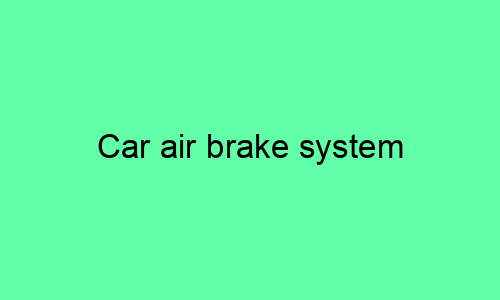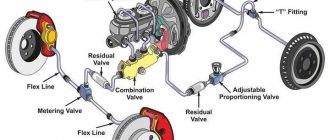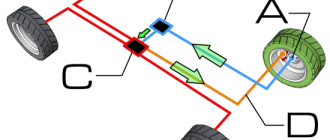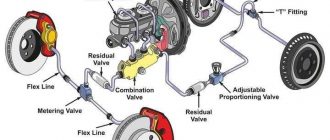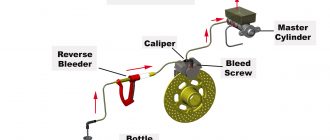Car Air Brake System
Introduction
Air brakes are a type of brake that uses compressed air to apply pressure to the brake pads or shoes. This allows for much greater braking force than can be achieved with hydraulic brakes, which rely on the force of the driver’s foot to push fluid through the brake lines. Air brakes are typically used on heavy vehicles, such as trucks and buses, but they can also be found on some passenger cars.
Components of an Air Brake System
The main components of an air brake system are:
* **Air compressor:** The air compressor is responsible for compressing air and storing it in the air tanks.
* **Air tanks:** The air tanks store the compressed air until it is needed to apply the brakes.
* **Brake valve:** The brake valve controls the flow of air from the air tanks to the brake chambers.
* **Brake chambers:** The brake chambers convert the compressed air into mechanical force that is used to apply the brakes.
* **Brake pads or shoes:** The brake pads or shoes are the components that actually stop the vehicle.
How an Air Brake System Works
When the driver steps on the brake pedal, the brake valve is opened, allowing compressed air to flow from the air tanks to the brake chambers. The brake chambers then convert the compressed air into mechanical force that is used to push the brake pads or shoes against the brake rotors or drums. This creates friction that slows down or stops the vehicle.
Advantages of Air Brakes
Air brakes have several advantages over hydraulic brakes, including:
* **Greater braking force:** Air brakes can provide much greater braking force than hydraulic brakes. This is because the compressed air can be used to apply more force to the brake pads or shoes.
* **Reduced heat buildup:** Air brakes do not generate as much heat as hydraulic brakes. This is because the compressed air does not need to be heated up in order to apply the brakes.
* **Less maintenance:** Air brakes require less maintenance than hydraulic brakes. This is because there are fewer moving parts and less fluid to leak.
Disadvantages of Air Brakes
Air brakes also have some disadvantages, including:
* **Slow response time:** Air brakes can take longer to apply than hydraulic brakes. This is because the compressed air has to travel from the air tanks to the brake chambers.
* **Potential for leaks:** Air brakes can leak if there is a hole in the air lines or if a component fails. This can lead to a loss of braking power.
* **Complexity:** Air brake systems are more complex than hydraulic brake systems. This can make them more difficult to troubleshoot and repair.
Conclusion
Air brakes are a type of brake that uses compressed air to apply pressure to the brake pads or shoes. They offer several advantages over hydraulic brakes, including greater braking force, reduced heat buildup, and less maintenance. However, they also have some disadvantages, such as slow response time, potential for leaks, and complexity.
